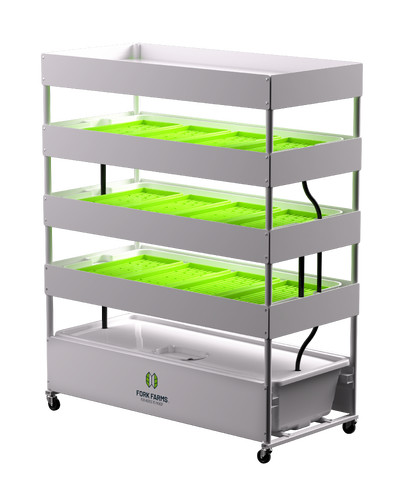Cultivating Knowledge: The Benefits of Hydroponics in K-12 STEM Education
Growing hydroponically serves as a powerful educational tool in classrooms. Hydroponics is a method of growing plants without soil in a nutrient-rich water solution. By combining hands-on experimentation, interdisciplinary learning, and technology, hydroponics provides opportunities for students’ engagement, critical thinking, and problem-solving skills. It offers an innovative and practical approach to teaching various scientific concepts while cultivating an understanding of sustainable agriculture. It can inspire and prepare students for future STEM and develop a lifelong appreciation for science and the environment.
This article was originally published in the July 2023 issue of STEM Magazine and can be accessed via this link.
HANDS-ON LEARNING FOR CRITICAL THINKING & PROBLEM-SOLVING SKILLS:
One of the primary advantages of hydroponics in STEM education is the opportunity for hands-on learning. A hydroponic farm allows students to observe, experiment, and actively participate in the growth of plants. With the Flex Farm, an indoor hydroponic farm, students can observe and document the entire life cycle of plants – from germination to harvesting – within a 30-day grow cycle. This hands-on experience provides a tangible connection to the biological processes of plants and allows students to witness the complexities of plant growth.
Growing hydroponically enables students to actively participate in real-world farming scenarios. Students can engage in activities such as: setting up and maintaining the hydroponic farms, preparing nutrient solutions, determining crop cycles and crop propagation, and monitoring the conditions necessary for plant growth. By taking responsibility for the well-being of the plants, students learn valuable skills and take on a sense of ownership.
Hydroponics in education provides an ideal platform for nurturing critical thinking, problem-solving, and inquiry-based learning skills. Students encounter various challenges throughout the hydroponic growing process when working to maintain optimal growing conditions. They must troubleshoot issues such as pH imbalances and nutrient deficiencies. These challenges encourage students to think out of the box, analyze problems, and find solutions. Through this, students learn to think analytically, make informed decisions, and implement effective solutions.
Fork Farms believes that hands-on learning through hydroponic growing is an empowering experience for students. To support classrooms and educators, Fork Farms has developed a complete K-12 curriculum to be used in conjunction with growing hydroponically in the system. Through this, students learn about STEM, nutrition, and how to be a sustainable global citizen.
Discover the Flex Farm
An educational hydroponic farming experience in YOUR community supported by OUR community. With the right technology, coupled with end-to-end growing support, anyone can be a farmer. Contact a Team Member to learn more.
ENVIRONMENTAL AWARENESS & SUSTAINABILITY:
Hydroponics offers an opportunity for students to learn about and contribute to sustainable practices for the planet and our health. Students can explore the impact of conventional farming practices on land and water resources, and how hydroponics helps mitigate these challenges. Environmental benefits of growing with hydroponic farms, such as the Flex Farm, include using 98 percent less water and 98 percent less land than traditional agriculture.
Engaging in hydroponic farming also prompts students to think about the broader implications of sustainable agriculture. They can explore topics such as: food security, food waste reduction, and the importance of maintaining a balanced approach to food production. Students can investigate other integrated solutions such as: composting, crop rotation, and farm co-ops. These experiences spark critical thinking and inspire students to find creative and sustainable ways to address global food challenges.
By growing their food using hydroponics, students learn about the additional benefits of local food systems. This includes reducing carbon emissions associated with transportation and supporting community sustainability. Indoor hydroponic farms, like the Flex Farm, can grow fresh food anywhere, especially in places with limited space. This allows for localized food production since there are fewer requirements and eliminates the need for long-distance transportation. Through these learnings, students can build an understanding of the importance of sustainable food production, often encouraging them to become advocates in their communities for a more equitable food system.
COMMUNITY ENGAGEMENT & COLLABORATION:
Hydroponics provides a platform for community engagement and collaboration. Schools can partner with local nonprofits or urban agriculture initiatives to cultivate collaborative projects. Students can share their hydroponic knowledge and experiences with their community, promoting awareness of sustainable practices and food production.
Students can set up hydroponic farms in community nonprofits or allocate their hydroponic farms to grow fresh produce for hunger relief programs. This provides the opportunity for students, community members, and nonprofit professionals to collaborate and experience the benefits of hydroponics firsthand. The produce grown can be shared among participants, donated, or sold to support the sustainability of the project.
In fact, produce grown in hydroponic farms and then consumed by students has additional benefits beyond the learning experience. It has been found that students who grow their own fruits and vegetables tend to eat more of these healthful foods since they have learned about them and taken ownership of the process.
By involving their community in hydroponic farming, students create opportunities for shared learning, collaboration, and sustainable practices. These initiatives not only expand the impact of their hydroponic projects but also create a sense of community ownership and a deeper understanding of the importance of sustainable agriculture. Furthermore, this type of engagement with organizations and people outside the classroom nurtures social skills, effective communication, and teamwork.
CAREER EXPLORATION:
Teachers can ignite students’ interest in agriculture and related fields by incorporating hydroponic growing into their course curriculums. Hydroponic farming exposes students to new methods of growing fresh food that applies to large agricultural operations. Students gain valuable skills in nutrient management, crop rotation, plant propagation, and data analysis, which apply to careers in horticulture, agricultural science, engineering, and environmental science. Students may develop a passion for sustainable agriculture and pursue further studies or careers in these areas, contributing to the future of food production and environmental sustainability.
HYDROPONICS & STEM BENEFITS SUMMARY:
Growing hydroponically offers significant benefits and is a valuable hands-on learning tool in STEM education. By encouraging a sustainable mindset, hydroponics nurtures environmental stewardship and prepares students to tackle future challenges. Growing fresh food provides a unique experience that encourages students to think creatively about engaging with their communities and the global food system. Educators can use hydroponic farming as a powerful tool to cultivate knowledge, skills, and a lifelong passion for sustainable practices among students, paving the way for a brighter and more sustainable future.
This article was originally published in the July 2023 issue of STEM Magazine and can be accessed via this link.
Published: 2023
Grow student engagement by growing fresh food
Turn disengaged students into hungry learners and future changemakers with the Flex Farm. Learn more!
Important Links:
























